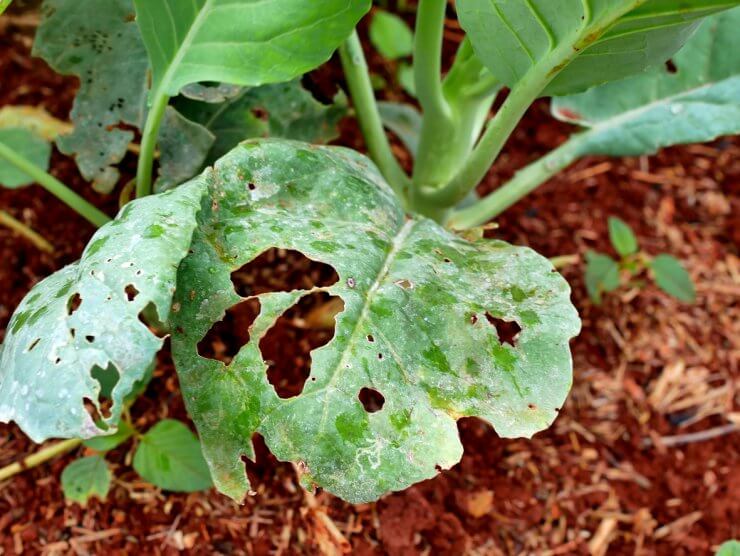
Damage to a Brussels Sprout plant from pests.
Gardening is a truly fascinating hobby. It’s biology, nature, outside time, and a little bit of zen all mixed together. And the results end up on your dinner table. Not bad. How cool is it that a handful of tiny little seeds will give you an abundance of vegetables and herbs a few months after you plant them? Except, sometimes gardening is a confusing and frustrating experience. Like when your formerly thriving garden now has white tiny bugs on plants from tomatoes to cucumbers to eggplants. And they’re eating away at what was supposed to be your dinner.
Discover 7 top tips for growing, harvesting, and enjoying tomatoes from your home garden—when you access the FREE guide The Best Way to Grow Tomatoes, right now!
Gardening is cool. The white tiny bugs on plants in your garden are not.
Insects are an important part of gardening. Ladybugs, or lady beetles as they are sometimes called, eat aphids, mites, thrips, and other harmful pests in your garden. Bees are famously beneficial. But the white tiny bugs on plants trying to grow in your garden are definitely not among those beneficial bugs. What are they? And more importantly, how can you get rid of them?
There are a few possibilities. The white tiny bugs on plants in your garden may be whiteflies, mealybugs, or spider mites.
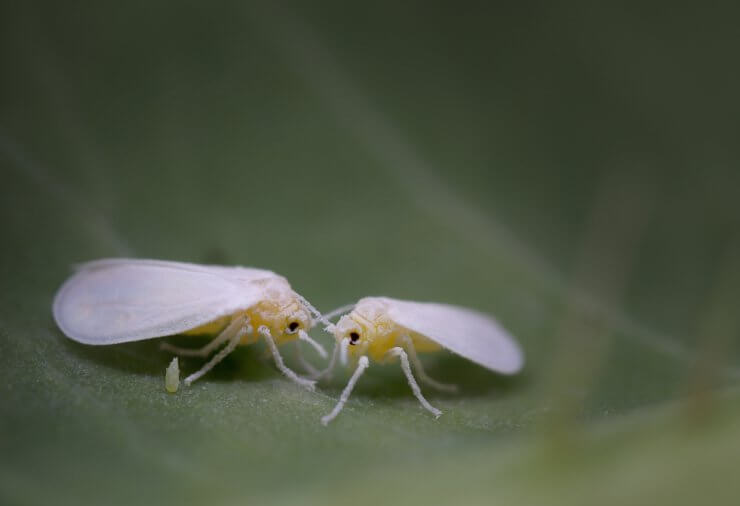
Whiteflies on leaf
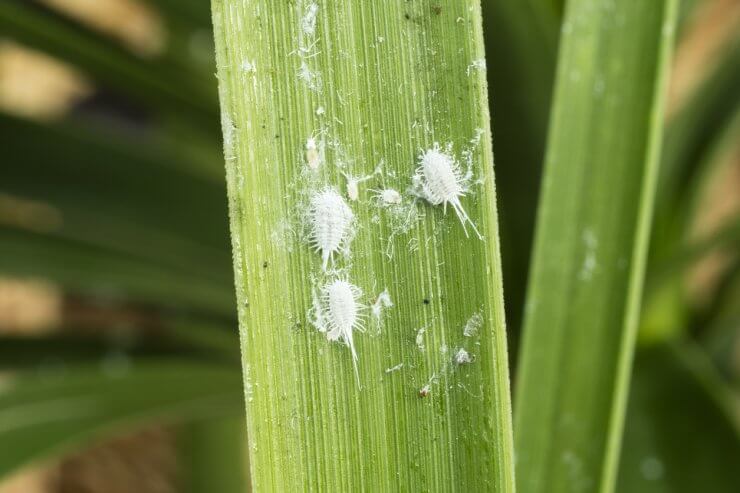
Mealybugs on leaf
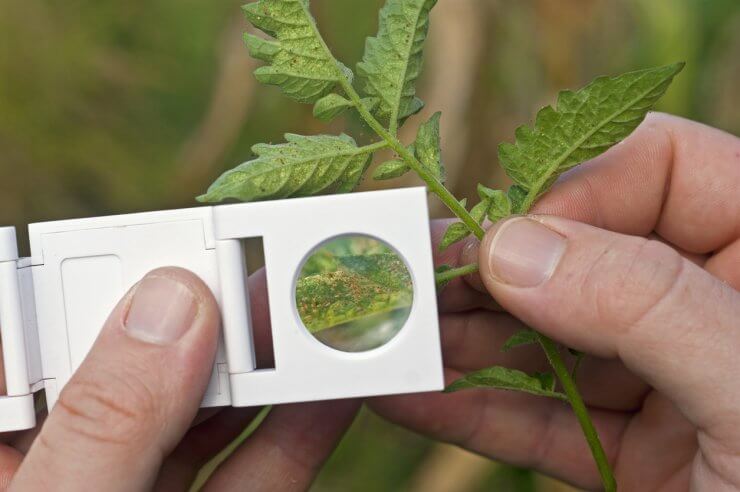
Spider Mite on leaf.
All three can live on a wide variety of plants and they feed by spearing the leaves and stems and sucking the sap. Clearly, this is not good. The tricky part, though, is that you might not even notice these bugs until you have a large infestation.
Here are a few things to look for that may indicate the presence of these pests. Mealybugs may just look like a white, cottony film that’s often mistaken for a fungus. Whiteflies are a little more obvious, as they will fly away when you shake the plant. Spider mites may leave small webbing around the plant and are tiny, but visible on the underside of discolored leaves.
No matter which of these you have, there’s no argument that all of them are bad for your garden. So how do you get rid of them? You can use traditional pesticides, but then you’re also impacting beneficial insects and pollinators, not to mention the fact that you are going to eat these herbs and vegetables, so I wouldn’t necessarily recommend that approach.
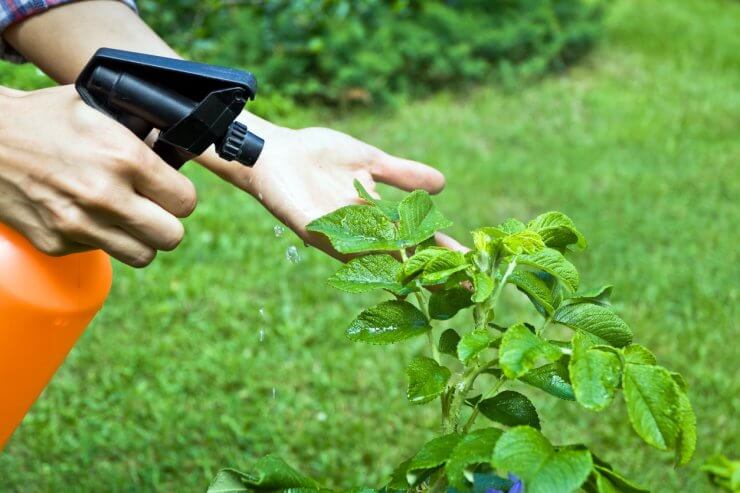
Spraying plants with organic pesticide.
How to get rid of those white tiny bugs on plants in your garden
Ideally, it’s best to control the population of these harmful insects so you don’t have to worry about getting rid of a large number of them. One very simple way to accomplish this is to give your garden a good blast with the hose. This physically removes the pests (and your plants get watered as a bonus).
You can also spray your plants with Neem oil.
To make a Neem oil spray, mix one ounce of oil with a gallon of water. Spray this mixture on your plants, making sure to get underneath the leaves as well. You don’t want the oil to magnify the effects of the sun and burn the leaves, so wait until early evening to do this.
The oil kills the bugs in two ways. It can coat the breathing holes of insects, and when ingested, it disrupts the growth, feeding, and mating cycle. Neem oil has the added benefit of also reducing mildew and fungus on plants, and evidence suggests that it has little if any negative effects on bees.
So next time you see tiny white bugs on your plants, you know what to do.
Have you had experience with these bugs on your plants? I’d love to know how you got rid of them. Please share your ideas in the comments.
Discover 7 top tips for growing, harvesting, and enjoying tomatoes from your home garden—when you access the FREE guide The Best Way to Grow Tomatoes, right now!





Will neem oil harm/kill my pollinators too? It seems I didn’t have any around for almost 2 weeks after one application of neem oil spray.
Neem oil is a naturally occurring pesticide found in seeds from the Neem tree. While Neem Oil has a very low toxicity rating for people and other mammals, it can be toxic to bees if not properly applied. Make sure you use the proper concentration and try applying Neem oil late in the evening or early in the morning when plants are not blooming and when bees are not typically out foraging.
I mix up a tsp of liquid dish detergent with 1 L water and use in a hand sprayer. It’s important to get the underside of the leaves, so it takes a bit of time. You need to repeat after a rain bcause the rain washes it all off and also repeat the spraying a time or two. at least twice per week. This works on pretty much everything.
In making the mixture, you say “oil”. Is that motor oil, olive oil ????
You buy NEEM OIL. – mix 1 oz with 1 gal of water – this makes Neem oil spray ????
How many time can I spray neem oil on my plants and vegetables? Because, I tried it and the white flies keeps coming back.
I have great luck with neem oil on any pests. I get it at ace hardware. They have a ready to use spray or the concentrate to mix with water.
Mealy bugs all over a number of houseplants and killed a lime tree and almost killed a garden is that we’re in for the winter….despite meek oil! Thought I had them and yesterday…all over an orchid.
Here too. Neem oil constantly barely keeps plants going….year after year. Nasty buggers
Me too!
My next door Neighbour had white flies on a rose which transferred themselves to my tomato plants. I must admit I did spray with insecticide at first then I found seaweed based fertiliser that was very effective like neeme oil when sprayed on leaves it leaves a sticky residue that white fly don’t like. Seafeed extra by envil, so I sprayed my neighbours rose which produced fantastic flowers and sprayed then water my tomatoes so thumbs up all round.
Can you use Neem oil on any bug or are there just a few bugs Neem would work on?
I have aphids on my grape vines every year. I have successfully used Murphy’s oil soap and vinegar several times but the bugs seem to come right back. Do I do it more often or do I need something stronger? We don’t like spraying chemicals on any food plants.
I chased these white bugs out of the plant with the pressure washer.
Tried many options beforehand: Plant sprayer with water, by hand / with a stick. But nothing helped. They are little sticky white critters.
If these critters ever come back, I will try it with the Neem Oil first.
Yes, I as given a couple of plants, one to plant outside, and one that was a House plant. The Angel Trumpet I planted outside, I didn’t know what it was, it didn’t survive. A couple of years later was given a House plant by the same person, I asked before she lift, what was the white stuff on it, oh just google it and it will give you different home remedies that you can make to get rid of it. She never once told me what it was, I googled it and found out how to treat it. Neeme oil, I found it at both Lowe’s and Home Depot in the garden department. Works good on Sawflies too!
Where can I buy Neeme oil?
You can usually find it at a garden supply store, but you can also find it on Amazon.
White flies infested my full bloom daisy collisious.. Very large daisies. Thinned out the daisies , removed the dead material, and sprayed neem oil all over/in/around with neem oil. Starting rainy season here in Tampa Bay area, so had to repeat after rains. Worked like a charm. Thanks for asking.
Neem oil is the best! So glad it worked for you.